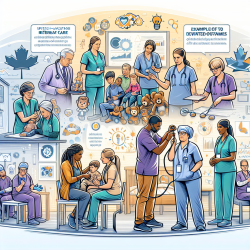Introduction
Recent research underscores the importance of addressing extreme self-reliance behaviors in suicidal adolescents. The study, "When Self-Reliance Is Not Safe: Associations between Reduced Help-Seeking and Subsequent Mental Health Symptoms in Suicidal Adolescents," reveals that extreme self-reliance is linked to reduced help-seeking and increased mental health symptoms. This blog explores how practitioners can use these findings to improve outcomes for at-risk youth.
Key Findings from the Research
The study examined 2,150 adolescents across six schools, focusing on their help-seeking behaviors and mental health symptoms. Key findings include:
- Youth endorsing extreme self-reliance had significantly higher depression and suicidal ideation scores.
- These adolescents were less likely to seek help from parents or friends but more likely to use anonymous online sources.
- Even when in treatment, they sought help from mental health professionals less frequently than their peers.
Implications for Practitioners
Given these findings, practitioners should consider the following strategies to encourage help-seeking behavior and reduce extreme self-reliance in suicidal adolescents:
- Assess for Extreme Self-Reliance: Incorporate questions about self-reliance behaviors into routine assessments to identify at-risk youth.
- Target Attitudes in Therapy: Use cognitive-behavioral techniques to challenge maladaptive beliefs about self-reliance and encourage the acceptance of help.
- Promote Healthy Help-Seeking: Educate adolescents about the benefits of seeking help from trusted adults and peers.
- Utilize Technology: Given the preference for anonymous online sources, integrate reputable online mental health resources into your practice.
Encouraging Further Research
While this study provides valuable insights, further research is needed to explore the long-term effects of interventions targeting extreme self-reliance. Practitioners are encouraged to contribute to this growing body of knowledge by documenting their experiences and outcomes.
Conclusion
Addressing extreme self-reliance in suicidal adolescents is crucial for improving their mental health outcomes. By implementing these research findings, practitioners can help at-risk youth develop healthier help-seeking behaviors and reduce their mental health symptoms.
To read the original research paper, please follow this link: When Self-Reliance Is Not Safe: Associations between Reduced Help-Seeking and Subsequent Mental Health Symptoms in Suicidal Adolescents.










